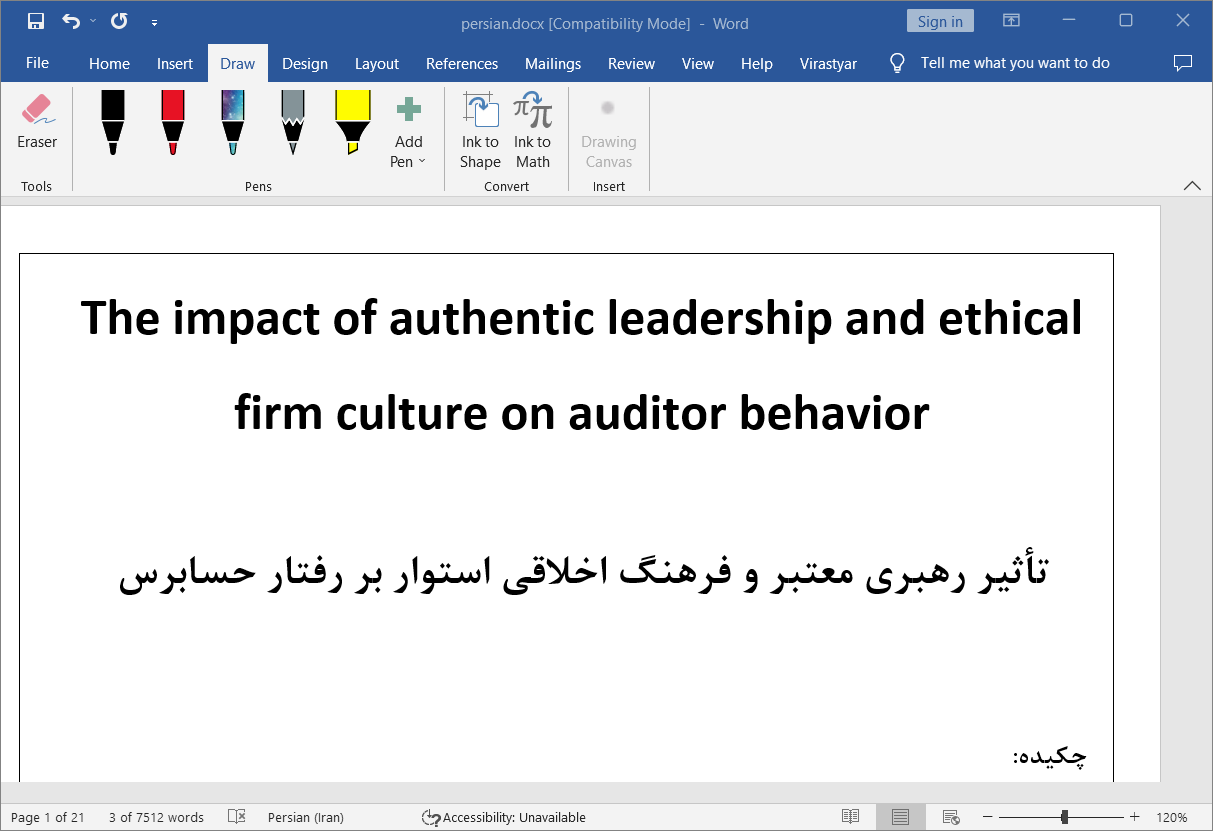چکیده:
رفتار غیرحرفهای باعث ایجاد چند رسوایی مالی و شکست تجاری معروف شده است. بسیاری از افراد حسابرسان خارجی را به دلیل ناتوانی در شناسایی و یا گزارش خطا و تقلب در گزارشهای مالی سرزنش میکنند. مدیران بنگاههای بزرگ حسابرسی برای ایجاد محیطهای بنگاهی اخلاقیتر بهعنوان ابزاری برای جلوگیری از رفتار مخرب حسابرسان (DAB) تحتفشار قرار دارند. این توصیه بر مبنای دو مفروض ارائه میشود: (1) رفتار حسابرس یکی از عناصر کیفیت حسابرسی است و (2) رفتار کارکنان تحت تأثیر فرهنگ اخلاقی ایجادشده از سوی مدیران است. اما شواهد تجربی اندکی درباره فرهنگ بنگاههای حسابرسی وجود دارد و پژوهشهای مربوط به نحوه تأثیرگذاری رهبری و فرهنگ بنگاه بر کیفیت حسابرسی از آنهم کمتر است. این مطالعه برای بررسی برداشت زیردستان از مدیران در حرفه حسابرسی و تأثیر احتمالی مدیران بر فرهنگ بنگاه و رفتار حسابرس طراحیشده است. تحلیل پیمایشهای 120 حسابرس مسئول نشان میدهد که اکثر مدیران بنگاهها سطح بالایی از متغیرهای رهبری اصیل (شفافیت، دیدگاه اخلاقی، خودآگاهی، پردازش متوازن) را نشان میدهند.
علاوه بر این، تصور بر این است که فرهنگ بنگاهها بسیار اخلاقی است. مشخص شد که این معیارهای رهبری اصیل و فرهنگ اخلاقی سازمان در یک سطح آماری معنادار با برداشت حسابرسان مسئول از فراوانی DAB همبستگی دارد. این مطالعه حائز اهمیت است زیرابه توضیح عوامل مؤثر بر تفاوت رفتار مخرب حسابرسان کمک میکند. یافتههای این پژوهش نشان میدهد که وقتی زیردستان مدیران خود را اصیل تلقی کنند و آنها را جزئی از فرهنگ اخلاقی بنگاه بدانند، فراوانی رفتار مخرب حسابرسان کاهش مییابد.
کلیدواژهها: فرهنگسازمانی، رفتار حسابرسی، رهبری اصیل، رفتار مخرب حسابرس، فرهنگ اخلاقی
Abstract
ABSTRACT
Unprofessional behavior has resulted in several high-profile financial scandals and
business failures. Many blamed external auditors for failing to detect and/or report errors and
fraud in financial reports. Leaders within major audit firms are urged to foster more ethical firm
environments as a means of inhibiting dysfunctional auditor behaviors (DAB) s. This advice is
based on two assumptions: (1) auditor behavior is one element of audit quality and (2) the
behavior of employees is influenced by the ethical culture created by leaders.
Little empirical evidence exists, however, about audit firm cultures, and there is even less
research on how leadership and firm culture impacts audit quality. This study was designed to
examine subordinates’ perceptions of leaders within the audit profession and the leaders’ likely
impact on firm culture and auditor behavior. Analysis of surveys from 120 in-charge auditors
suggest that most firm leaders exhibit high levels of the constructs (transparency, ethical
perspective, self-awareness, balanced processing) comprising authentic leadership. Further, firm
cultures were perceived to be highly ethical. These measures of authentic leadership and ethical
organizational culture were found to be negatively correlated, at a statistically significant level,
with in-charge auditors’ perceptions of the frequency of DAB.
This study is important because it helps to explain factors impacting variance in
dysfunctional auditor behavior. The findings from this research suggest that when subordinates
perceive their leadership as authentic and view themselves as part of an ethical firm culture, a
decline in the frequency of dysfunctional auditor behavior follows.
Keywords: Organizational culture, Auditing behavior, Authentic leadership, Dysfunctional
Auditor Behavior, Ethical culture
- چکیده
- مقدمه
- منابع و فرضیات
- نظریه رهبری اصیل
- فرهنگ اخلاقی بنگاه
- مواضع اخلاقی حسابرسان مختلف و سایر مشخصات فردی
- روش و تحلیل مقدماتی
- جمع آوری داده ها
- معيارها
- ALQ
- CEV
- EPQ
- DAB
- يافته ها
- ارزش اخلاقی سازمانی
- مواضع اخلاقی حسابرسان ارشد
- رفتارهای مخرب حسابرسان
- تحلیل
- خلاصه، محدودیت ها و پیشنهادهایی برای پژوهش های آتی

نقد و بررسیها
هنوز بررسیای ثبت نشده است.